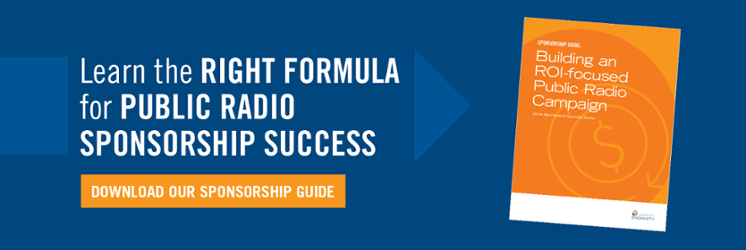Using NPR's Diverse Programming to Your Marketing Advantage
Stereotypes are dangerous. They breed mistrust, fear, and even false confidence and misplaced trust. Stereotypes cause us to accept often false images of what someone or something represents. This preconceived notion prevents us from making connections, enjoying experiences, or learning new things.
NPR is no stranger to stereotyping when it comes to its audience or programming. However, diverse NPR stations address a wide variety of voices and subject matter.
Diverse NPR Programming
Some companies use diversity as a buzzword or as part of a marketing campaign. What sets those businesses apart is that they don't sufficiently grasp that diversity isn't as simple as holding a training seminar or hiring more people of color, though both are important steps in the right direction. Diversity is multifaceted, including celebrating differences instead of reacting to them, targeting more diverse candidates on various job boards, recognizing and avoiding unconscious bias in hiring and managing, and strengthening anti-discrimination policies. Finally, the businesses that genuinely want to be inclusive represent a diverse customer base with their offerings.
NPR is committed to absorbing diversity into its mission and culture and not as a one-off project. This approach makes inclusion and diversity intrinsic to its work, and it is reflected in its programming:
- Alt. Latino - This program highlights Latinx culture, arts, stories, music, and conversations.
- Rough Translation - The Rough Translation podcast focuses on various cultural misinterpretations and how we can learn from them.
- Code Switch - Winner of Apple's 2020 Show of the Year, Code Switch features bold conversations that address race and its impacts on music, food, history, politics, and pop culture.
- It's Been a Minute - Discussion with cultural leaders and other journalists on what is happening in the world.
Diverse programming can help you reach your target audience. Because inclusive programming represents a multitude of races, ethnicities, sexual orientations, gender identities, cultures, abilities, and religious beliefs, it connects with a broader audience. Sponsoring inclusive programming shines a more favorable light on your brand and fosters customer engagement, particularly with traditionally underrepresented groups.
Public radio sponsorship comes with the benefit of a loyal audience. Remember, virtually every single person in the U.S. can enjoy a public radio station and, in some cases, can choose between more than one. That makes sponsorship messages not only powerful but cost-effective. Since the listening audience is consistent and engaged, sponsorship messages can reach a highly specific target group with less frequency.
Another benefit of presenting your sponsorship message to a highly engaged, loyal audience is in their mindset. The listeners are practically hardwired to take action. According to an NPR Impact Study, 97% of the audience takes a action after hearing or reading NPR content. 80% visited a website, and 73% were inspired to read or purchase a book referenced on the broadcast.
One of the reasons for the phenomenal success of sponsorship is the Halo Effect. It is a positive unconscious bias that occurs when the audience associates a sponsoring brand with shared goals, causes, and values by virtue of supporting stations and programming that represent what's important to them. By targeting your audience, you engage and connect more deeply with your consumer group.
Target a Broader Audience by Sponsoring Inclusive Public Radio Programming
Inclusion means recognizing, respecting, supporting, and honoring our differences. We are all different, with assorted backgrounds, interests, and views. However, regardless of age, religion, sexual preference, race, disability, or gender identity, we all have a deep need to be seen and heard. Honoring what is different among us can bring us closer.
That is NPR's goal: learning and growing together through discussing, sharing, and exploring a myriad of topics. Diverse programming provides a platform for underrepresented demographics to use their voice. It elevates the conversation to make us open our eyes and move out of our comfort zones. Inclusive programs bring unconscious bias and harmful stereotyping to light so that we can start to change.
Sponsoring public radio offers an automatic boost to your brand. Public radio sponsors are viewed as benefactors rather than advertisers. The audience automatically attributes the sponsor's brand with supporting causes and issues important to them. Working with an experienced media partner can help you place a sponsorship in a program that your audience connects with.
Whether you’re interested in sponsoring one of our public media stations or learning more about turnkey sponsorship representation for your station, we can help. Complete the form, and we’ll be in touch soon.
Subscribe
Every week we share insights, industry news or best practices on public media sponsorship. Receive a weekly digest of our latest blog posts so you’re always in the know.
